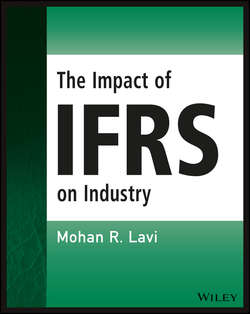Читать книгу The Impact of IFRS on Industry - Lavi Mohan R. - Страница 6
На сайте Литреса книга снята с продажи.
Chapter 1
Introduction: The Background and Evolution of IFRS, and a Discussion on Why IFRS Would Have an Impact on Industry
1.1 Rule-based vs. Principle-based Standards
ОглавлениеReaders are probably aware that it was an Italian mathematician named Luca Pacioli who invented the double entry system of accounting. Being a mathematician, he was most likely content if the debit mathematically matched the credit. In those days transactions were simple, and cost would have been the basis of most accounting. However, as business flourished, accounting issues did too.
It would appear that actual pressures on the accounting profession to establish uniform accounting standards began to surface after the stock market crash of 1929 in the United States. Some feel that insufficient and misleading financial statement information led to inflated stock prices and that this contributed to the stock market crash and the subsequent depression. The 1933 Securities Act and the 1934 Securities Exchange Act were designed to restore investor confidence. The 1933 act sets forth accounting and disclosure requirements for initial offerings of securities, stocks and bonds. The Financial Accounting Standards Board (FASB) was formed in the United States to develop accounting standards. It was in 1938 that the Committee on Accounting Procedures was formed – this committee issued what would be probably the first set of accounting standards – and issued 51 Accounting Research Bulletins on an eclectic variety of topics including business combinations. Though accountants had something to refer to, with the passage of time, these bulletins attracted a lot of criticism for giving too many options and not dealing with complicated situations and transactions. In June 1973, the International Accounting Standards Committee (IASC) was formed to develop international accounting standards. There seemed to be an unwritten rule that the FASB would formulate accounting standards that would apply only in the United States – a rule that applies even now to a limited extent. Over the years, both the accounting bodies issued numerous accounting standards. In doing so, and maybe unwittingly, they developed standards based on totally different concepts – the FASB developed Standards based on rules while the IASC developed Standards based on principles. As subsequent events would prove, there is a world of difference between these two concepts. Rule-based standards suggest that the quantity of standards is due more to the fact that rules have to be established for different industries, while principle-based standards appear much simpler – just lay down the principle and leave the rest to the user of the standard.
The debate on whether principle-based standards score over rule-based standards has been going on for some time now and will probably continue in the future too. Purely on the basis of historical experience, it can be stated with some authority that both approaches have their pros and cons.
Principles-based standards require more judgment that firms could exploit opportunistically. In 2002, the FASB observed that a principles-based approach could lead to abuse, whereby the principles in accounting standards are not applied in good faith consistent with the intent and spirit of the standards. Ironically, the Enron episode occurred a few months later. Critics were quick to point out that aggressive accounting is likely to be easier to justify (or detect by auditors) under rules-based standards because detailed guidance or thresholds are explicitly stated. It was also felt that principles-based standards might lead to more informative earnings since they allow greater flexibility for firms to choose accounting methods that better reflect their economic realities. Following this reasoning, the SEC and FASB have both indicated a preference for principles-based standards because they allow accounting professionals to operationalise accounting treatments in a manner that best fulfils the objective of each standard and thereby best captures the underlying economic reality. On the other hand, from the perspective of statement preparers and auditors, the principles-based accounting system presents higher uncertainty due to lack of detailed guidance. The risk of being perceived as out of compliance may cause preparers to stray from the desired accounting treatment due to the increased risk of second-guessing.
Prior research that directly tests the effect of principles-based versus rules-based accounting standards on accounting quality has been conducted mostly in experimental settings. Evidence from these experimental studies generally supports the notion that principles-based standards improve accounting quality over rules-based standards. For example, in their experiments Agoglia, Doupnik, and Tsakumis (2011) find that CFOs are less likely to report aggressively under a principles-based standard than a rules-based standard.
The end of Enron signalled the beginning of a period in which the world started looking differently at the entire circle of accounting – accounting standards, accounting regulators and auditors. It was felt that having a single set of accounting standards would be the way to go forward – however idealistic that may sound. Both the International Accounting Standards Board (IASB, which succeeded the IASC) and the FASB decided to do something about it.
